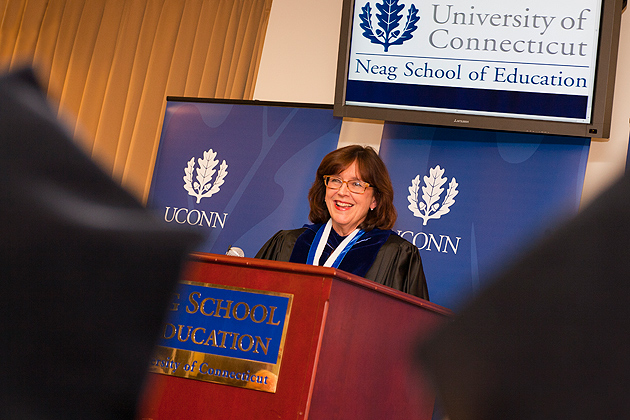
Educational psychology professor Sally M. Reis, principal investigator for the National Research Center on the Gifted and Talented, and nationally recognized for her work with academically talented and high potential students, has been named the first to hold the Letitia Neag Morgan Chair for Educational Psychology.
The endowed chair was established in honor of Reis’ mother, who died in October 2010. Ray ’56 (CLAS) and Carole Neag, generous supporters of the Neag School of Education at UConn, established the chair through a $1.5 million endowment. Letitia Neag Morgan was Ray Neag’s sister.
An investiture ceremony for the chair, held on Nov. 17, was attended by family members, friends, and colleagues.

“I grew up in a home with a mother who loved all six of her children unequivocally,” said Reis. “Through the generosity of my wonderful uncle and aunt, Ray and Carole Neag, to know that my mother’s name will endure in this chair brings such joy to all of our family.”
Reis said she is grateful to family members and colleagues for their support, and grateful for her work.
“There were and have been days that I looked at a pile on my desk and wondered how I could finish what I needed to do that day, and I have found simply being grateful for meaningful work to carry the day.”
Reis is a distinguished scholar of the National Association for Gifted Children and a fellow of the American Psychological Association, two of the highest honors in her field. She is also a Teaching Fellow and Board of Trustees Distinguished Professor at UConn, two of the University’s highest honors for faculty.

In his recommendation to the Board of Trustees that Reis be appointed to the chair, UConn Provost Peter J. Nicholls wrote, “Dr. Sally M. Reis is an internationally recognized scholar and a champion of students of special needs, ranging from those with learning disabilities to gifted and talented students.”
Dean Tom DeFranco said Reis is not only an outstanding professional, she is also an excellent mentor to students. “If Sally was measured on her professional accomplishments alone she would be a giant in the field,” he said. “However, academicians recognize that our legacy is not built solely on our scholarly reputation but also on the impact and influence we have on our students. Over the years, Sally has built a legacy of being a good steward to the profession as well as a caring mentor to her students.”
One of Reis’ former Ph.D. students said, “Rarely does a day pass that I do not think about Sally and her profound influence upon my life and the lives of others. I am acutely aware that I hold my position today largely due to Sally’s mentoring, modeling, teaching, and friendship, and the outstanding education she afforded me at UConn. I remember how Sally took care of her graduate students, and I try to pay it forward in true Sally Reis style.”
Reis said the chair will help her continue her research on children of poverty and from working class families, those with disabilities, and those with talents that are not often recognized by their teachers.
Reis, a former teacher, completed her Ph.D. in educational psychology of the gifted and talented at UConn in 1981. She then returned to her school district to work in administration for seven years, until a position opened up at her alma mater, and she has been a member of the education faculty since that time.

In creating the chair, the Neags sought to pay tribute to the importance Letitia Neag Morgan placed on education and to reward significant contributions in the field of educational psychology.
“Our focus is UConn,” said Ray Neag, “and in thinking about what to do with some of our good fortune, we thought that because education was so important to Letitia, wouldn’t this be a nice way to honor her?”



